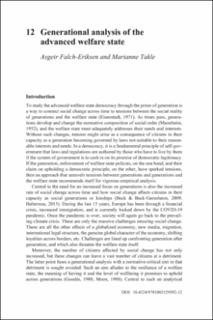Generational analysis of the advanced welfare state
Chapter, Peer reviewed
Published version
Permanent lenke
https://hdl.handle.net/11250/2788095Utgivelsesdato
2021-09-13Metadata
Vis full innførselSamlinger
Sammendrag
In this chapter, we begin by laying out the interconnection between generation-belonging and welfare state services, and argue how generations shape the welfare state, whereas the welfare state shapes how generations pass on through life. The aim of the chapter is to sketch central components for how to perform generational analysis of the welfare state. Welfare state services are directly linked to what generation a citizen belongs to. This chapter thereby continues to lay out the four different concepts of generation, social generation, which are birth cohorts that are socially embedded, kinships, which is about generational belonging and roles, historical generations, which is about social generations that represent a driving force of social change, and lastly future generations, which is more of an analytical tool that points towards the sustainability and resilience of a welfare state guaranteeing wellbeing of future generations. The focus of generational analysis is then argued to be focused on the causes of social change and that tensions between the social reality where generations reside and the welfare state must be mended in order to secure a welfare state that lives up to its democratic mandate.

